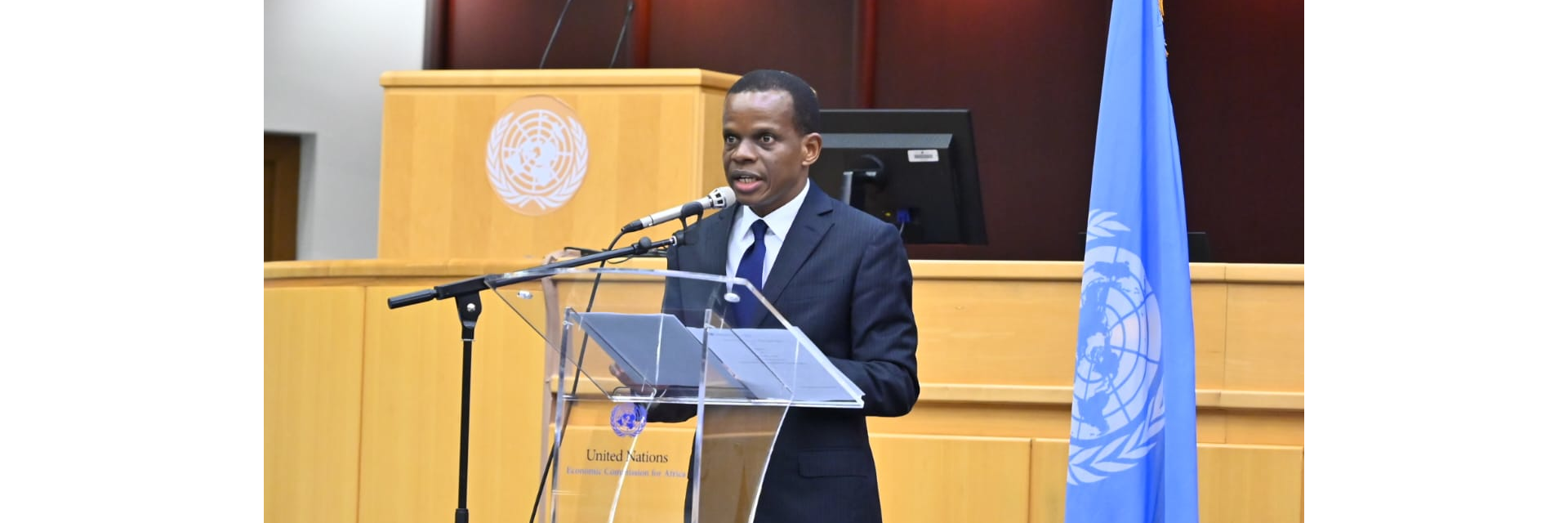His Excellency, Ambassador Tesfaye Yilma, State Minister for Political and Economic Diplomacy of the Federal Democratic Republic of Ethiopia
Her Excellency, Dr. Monique Nsanzabaganwa, Deputy Chairperson of the African Union Commission,
Her Excellency, Mrs Hope Tumukunde, Permanent Representative of the Republic of Rwanda and Chair of the Africa Hall Advisory Board
Members of the Diplomatic Community
Colleagues from the United Nations family
Distinguished guests,
Ladies and Gentlemen,
It is great honour to welcome you to this important ceremony on the occasion of the groundbreaking of the African Hall Project.
In 1963, the Charter of the Organization of the African Unity (OAU) was signed in the Africa Hall, becoming perhaps the single most significant achievement of unity for Africa’s post-colonial history.
It is because of this that we have the African Union today. And no more has the legitimacy of the AU been validated than the continental coordinated response to the Covid-19 pandemic.
Of course, we must recognize the role of Ethiopia in fostering this achievement through the generous donation of Emperor of Ethiopia Haile Selassie at the time.
Excellences,
Distinguished guests,
The Africa Hall is first a representation of where the continent has come from, where it is now, and where it is headed to.
But, more than that, and this is the second, it is an opportunity of economic diversification both for Ethiopia and Africa as a whole.
Let me share the magnitude of such opportunity.
Today, the global value of international trade in the export of cultural goods stands at over US$ 18trillion. Cultural heritage remains one of the main reasons for travel to major destinations, thus boosting the tourism economy.
For example, as a leading tourist destination, France’s trade in the export of cultural goods is over US$11 billion, more than ten times that of all of Africa, at about US$725 million.
In reality, we import more cultural goods than we export. This is despite our rich continental heritage.
The modernization of the Africa Hall will preserve and restore the historical and cultural values embedded in its architecture, and also enable Africa to tap into the global creative industry, which is estimated to reach US$985 billion by 2025[1].
We are already witnessing the power of the creative sector in Africa.
In 2015, the creative industries, comprising music, film, art and fashion, generated a total of US$ 4.8 billion for Nigeria with the country currently earning over US$ 11 billion and generating 4.2 million jobs[2], contributing about 2.3% of the Nigeria’s GDP[3].
Further, through the African Continental Free Trade Area, regional creative trade can offer even more opportunities. For example, the bulk of the creative industries trade takes place at the regional level, with Nigeria and South Africa trading at 94% and 61% with the Africa respectively. This figure is 80% for Uganda and 82% for Tanzania.
Excellencies,
Ladies and Gentlemen,
The message here is simple.
We must make our history and culture, in other words heritage, work for our economic growth and diversification.
But to reap these benefits, we must address a few challenges.
Most notable is the paucity of data.
Inadequate availability of data presents a major obstacle in formulating appropriate policies that could enhance the trade in cultural goods and bolster Africa’s economic growth and development.
To address these challenges, UNECA has been championing the construction of tourism satellite accounts which measure the direct economic contribution of the tourism sector, including its contribution to GDP and employment in countries.
Given the urgent need to also consider establishing culture satellite accounts, I am happy to note that the UN Statistics Division, in collaboration with key partners, is working on developing international recommendations for the compilation of national culture satellite accounts.
This will not only enable an empirical understanding of the sector’s contribution to respective economies, but also facilitate international comparability of culture statistics.
Excellencies,
Ladies and Gentlemen,
In addition to resolving our data issues, is the importance of African ownership of our culture and heritage, not only as a point of pride and a symbol of perseverance, but especially in the context of the continent’s economic growth and development, as informed by Agenda 2063 and the 2030 Agenda for Sustainable Development.
In closing, I would like to take this opportunity to highlight ECA’s vision in terms of using the future renovated Africa Hall building.
Beyond one of the state-of the-art conferencing places in Addis Ababa, our vision is for it to be a significant tourism destination, incorporating the rich history of the pan-African movement through a permanent exhibition, featuring professionally curated cultural, historical and natural heritage sites.
In addition, it will showcase great and notable works of pan-African artists, as well as serve as a hub for a variety of activities focused on showcasing Africa’s history, the achievements of the United Nations family and Ethiopia’s role in Africa’s modern history and culture.
To this end, I would like to invite African member States to make use of the Africa Hall. It is your house!
Finally, I would like to reaffirm UNECA’s support towards the strengthening Africa’s cultural heritage.
This groundbreaking ceremony marks a new beginning for the continent.
I thank you for your kind attention.
[1] https://www.g20-insights.org/policy_briefs/creative-economy-2030-inclusive-and-resilient-creative-economy-for-sustainable-development-and-recovery/

